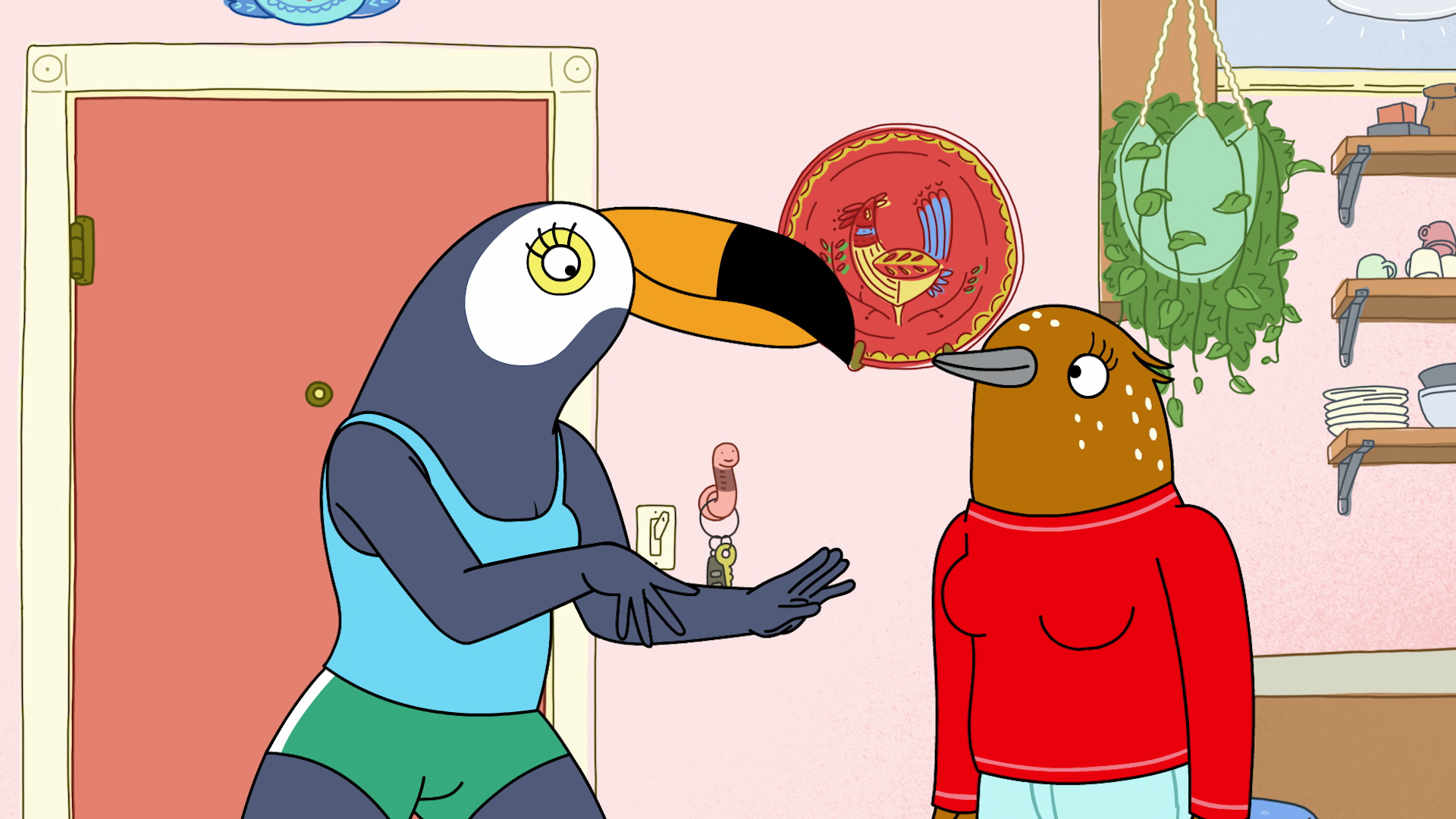The magical earnestness of the new adult cartoon
How a new wave of animated series is fusing absurdity and emotional depth


A free daily email with the biggest news stories of the day – and the best features from TheWeek.com
You are now subscribed
Your newsletter sign-up was successful
In one especially moving episode in the first season of Tuca & Bertie called, "The Jelly Lakes" we meet a character who creates beautiful dioramas out of broken eggs. We see her meticulously fill each one with various kinds of art — paper cut-outs of animals and natural landscapes that are evocative and sincere. "I fill the shells with the scenes from my life and dreams and I take it all very seriously," the artist explains before playfully eating one of her own creations. "Just kidding! I like jokes!"
Later in the episode, the egg diorama becomes the backdrop through which one of the series main protagonists ends up discussing her own experience with trauma. As we are ushered into the story, the viewer learns that though the artful egg may be playful and whimsical, it is also a place of beauty, exploration, and truth.
At first glance, the chaotic, salacious, and colorful world of Tuca & Bertie seems to revel in its absurdity. The show, which revolves around the lives of two 30-something bird girl besties, takes place in a world where there are not only animal-people (a common cartoony occurrence) but also plant-people, walking around on two legs with ginormous flowers and leaves where their heads should be. Tuca & Bertie's visual delights seamlessly weave pastel-hued fashions with other-worldly creatures and a constant stream of fourth wall-breaking narration. In the world of Tuca & Bertie, buildings have breasts, lakes are made of jelly, and sex bugs are humanoid creatures who provoke havoc by canoodling all over the place. They also start a band.
The Week
Escape your echo chamber. Get the facts behind the news, plus analysis from multiple perspectives.

Sign up for The Week's Free Newsletters
From our morning news briefing to a weekly Good News Newsletter, get the best of The Week delivered directly to your inbox.
From our morning news briefing to a weekly Good News Newsletter, get the best of The Week delivered directly to your inbox.
The visual gags and ribald humor of Tuca & Bertie are certainly fun and zany, but the show has a more tender side as well, tackling issues like mental and emotional health, the promise and pitfalls of "adulting," as well as the pain of sexual trauma and abuse. These moments of seriousness don't seem out of place in the overall texture of the series. In fact, in one particularly poignant episode, we see how the show's use of animation actually helps depict abuse in a way that centers the victim's story and neither sensationalizes nor obscures important details.
In this way, Tuca & Bertie joins the plethora of 21st century adult cartoons that insist there is tremendous power in re-imagining our everyday lives as something magical. From shows like Rick and Morty to BoJack Horseman to Big Mouth to online web-comics like Lunar Baboon and Strange Planet, today's adult cartoon is not only positioned as a silly place, but a tender and honest one too. Unlike the live action sitcom, which often follows a template for sentimentality, the earnest adult cartoon is provocative precisely because it insists on allowing viewers a range of emotions, from utter delight to absurd fascination to outright sorrow.
In some ways, this insistence on emotional depth harkens back to such cartoon classics like Peanuts, as well as Disney and Pixar's phenomenal body of artful animation that tugs at viewer's heartstrings. And yet, cartoons like these have always been positioned as having an audience of both kids and parents. In contrast, the 21st century cartoon is clearly indicated for grown-ups, insisting that animation for adults doesn't have to just be about snark, but also about substance.
Take Rick and Morty's "Pickle Rick" episode, where Rick, genius scientist, transforms into, a sentient pickle, who is then able to walk about by using the body parts of a rat he has killed. The ensuing drama of Pickle Rick is (clearly) incredibly violent and absurd, and yet the core of the episode is an emotional scene depicting Rick in family therapy, where he needs to account for the ways in which his behavior has hurt the people he loves. The disconnect in seeing a surly, violent pickle talking to a kind and wise therapist about his feelings, is both incredibly amusing, as well as surprisingly heartfelt. It offers an avenue to look closely at the real emotional development of Rick and Morty's characters without seeming like some kind of trite after-school special.
A free daily email with the biggest news stories of the day – and the best features from TheWeek.com
This fusion of absurdity and emotional depth certainly isn't unique to the current moment — the history of adult-specific animation is filled with dramatic, disturbing, and other-worldly cartoons that stretch viewer's imaginations. From the range of absurd delights found on Adult Swim, to the continued influence of beloved animated sitcoms like The Simpsons, Futurama, South Park, and Family Guy, no one today could possibly argue that animation is just for kids. Yet this most recent wave of adult animation stands out because of its increasing interest in exploring the emotional depths of its characters. At a time when one's appetite for sarcasm and just general meanness can be whetted by simply going on Twitter for a few minutes, adult cartoons are increasingly positioning themselves as a respite from the cruelties of the world, rather than a place to indulge in bad behavior.
This robust emotional range is buttressed by the fact that these 21st century animated series are more and more centering female voices. The world of BoJack Horseman is filled with rich female characters who are bright, ambitious, and filled with the same existential anxieties as antihero male protagonists, just as a show like Big Mouth illustrates how it's possible to find humor in both male and female awkward experiences of puberty. Rick and Morty's famous shift to gender-equity in the writer's room may have provoked online backlash from some fans, but it also clearly led to many of season three's most exciting and nuanced episodes, including "Pickle Rick."
These modern animated series illustrate how embracing a wider range of voices is essential for nuanced and compassionate storytelling, and that an emphasis on empathy doesn't come at the expense of offbeat, wild, or gross humor. Instead, today's new wave of smart, nuanced adult animation is earning viewers precisely because of its daring and the way it trusts audiences to tackle complexity.
At the end of Tuca & Bertie's "The Jelly Lakes" episode, we see the artist who creates beautiful designs out of cracked eggs create a new design, this time reflecting the strange journey she and her friends just had, one that includes a fight with a giant, violent crab, who actually becomes part of the friend-group when the fight is over. In the diorama, the crab is seen participating in the gathering around the campfire, cheerfully holding a mug, even though its leg is being roasted on the fire. The absurd scene brings levity to a serious episode and also illustrates one of the core truths of the modern adult animated series: that things that are broken may not be able to be fully repaired, but they can be a site of beauty and wonder too.
Arielle Bernstein is a writer and cultural critic. Her work has been featured in The Atlantic, The Guardian, AV Club, and Salon, among other publications. She is a professorial lecturer at American University in Washington, D.C.
-
 6 of the world’s most accessible destinations
6 of the world’s most accessible destinationsThe Week Recommends Experience all of Berlin, Singapore and Sydney
-
 How the FCC’s ‘equal time’ rule works
How the FCC’s ‘equal time’ rule worksIn the Spotlight The law is at the heart of the Colbert-CBS conflict
-
 What is the endgame in the DHS shutdown?
What is the endgame in the DHS shutdown?Today’s Big Question Democrats want to rein in ICE’s immigration crackdown
-
 Walter Isaacson's 'Elon Musk' can 'scarcely contain its subject'
Walter Isaacson's 'Elon Musk' can 'scarcely contain its subject'The latest biography on the elusive tech mogul is causing a stir among critics
-
 Welcome to the new TheWeek.com!
Welcome to the new TheWeek.com!The Explainer Please allow us to reintroduce ourselves
-
 The Oscars finale was a heartless disaster
The Oscars finale was a heartless disasterThe Explainer A calculated attempt at emotional manipulation goes very wrong
-
 Most awkward awards show ever?
Most awkward awards show ever?The Explainer The best, worst, and most shocking moments from a chaotic Golden Globes
-
 The possible silver lining to the Warner Bros. deal
The possible silver lining to the Warner Bros. dealThe Explainer Could what's terrible for theaters be good for creators?
-
 Jeffrey Wright is the new 'narrator voice'
Jeffrey Wright is the new 'narrator voice'The Explainer Move over, Sam Elliott and Morgan Freeman
-
 This week's literary events are the biggest award shows of 2020
This week's literary events are the biggest award shows of 2020feature So long, Oscar. Hello, Booker.
-
 What She Dies Tomorrow can teach us about our unshakable obsession with mortality
What She Dies Tomorrow can teach us about our unshakable obsession with mortalityThe Explainer This film isn't about the pandemic. But it can help viewers confront their fears about death.
